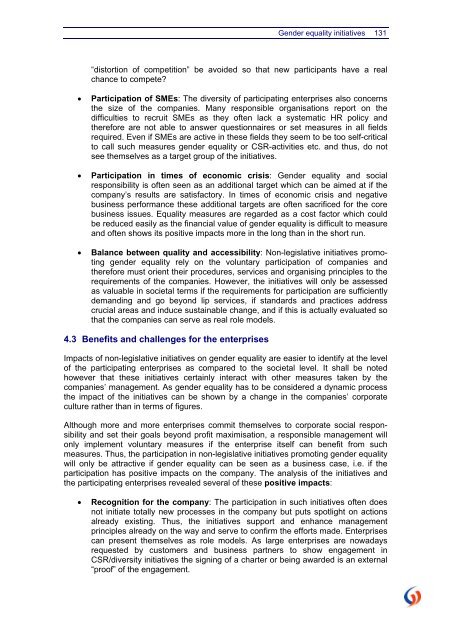Study on non-legislative initiatives for companies to promote gender ...
Study on non-legislative initiatives for companies to promote gender ...
Study on non-legislative initiatives for companies to promote gender ...
You also want an ePaper? Increase the reach of your titles
YUMPU automatically turns print PDFs into web optimized ePapers that Google loves.
Gender equality <strong>initiatives</strong> 131<br />
“dis<strong>to</strong>rti<strong>on</strong> of competiti<strong>on</strong>” be avoided so that new participants have a real<br />
chance <strong>to</strong> compete?<br />
• Participati<strong>on</strong> of SMEs: The diversity of participating enterprises also c<strong>on</strong>cerns<br />
the size of the <strong>companies</strong>. Many resp<strong>on</strong>sible organisati<strong>on</strong>s report <strong>on</strong> the<br />
difficulties <strong>to</strong> recruit SMEs as they often lack a systematic HR policy and<br />
there<strong>for</strong>e are not able <strong>to</strong> answer questi<strong>on</strong>naires or set measures in all fields<br />
required. Even if SMEs are active in these fields they seem <strong>to</strong> be <strong>to</strong>o self-critical<br />
<strong>to</strong> call such measures <strong>gender</strong> equality or CSR-activities etc. and thus, do not<br />
see themselves as a target group of the <strong>initiatives</strong>.<br />
• Participati<strong>on</strong> in times of ec<strong>on</strong>omic crisis: Gender equality and social<br />
resp<strong>on</strong>sibility is often seen as an additi<strong>on</strong>al target which can be aimed at if the<br />
company’s results are satisfac<strong>to</strong>ry. In times of ec<strong>on</strong>omic crisis and negative<br />
business per<strong>for</strong>mance these additi<strong>on</strong>al targets are often sacrificed <strong>for</strong> the core<br />
business issues. Equality measures are regarded as a cost fac<strong>to</strong>r which could<br />
be reduced easily as the financial value of <strong>gender</strong> equality is difficult <strong>to</strong> measure<br />
and often shows its positive impacts more in the l<strong>on</strong>g than in the short run.<br />
• Balance between quality and accessibility: N<strong>on</strong>-<strong>legislative</strong> <strong>initiatives</strong> promoting<br />
<strong>gender</strong> equality rely <strong>on</strong> the voluntary participati<strong>on</strong> of <strong>companies</strong> and<br />
there<strong>for</strong>e must orient their procedures, services and organising principles <strong>to</strong> the<br />
requirements of the <strong>companies</strong>. However, the <strong>initiatives</strong> will <strong>on</strong>ly be assessed<br />
as valuable in societal terms if the requirements <strong>for</strong> participati<strong>on</strong> are sufficiently<br />
demanding and go bey<strong>on</strong>d lip services, if standards and practices address<br />
crucial areas and induce sustainable change, and if this is actually evaluated so<br />
that the <strong>companies</strong> can serve as real role models.<br />
4.3 Benefits and challenges <strong>for</strong> the enterprises<br />
Impacts of n<strong>on</strong>-<strong>legislative</strong> <strong>initiatives</strong> <strong>on</strong> <strong>gender</strong> equality are easier <strong>to</strong> identify at the level<br />
of the participating enterprises as compared <strong>to</strong> the societal level. It shall be noted<br />
however that these <strong>initiatives</strong> certainly interact with other measures taken by the<br />
<strong>companies</strong>’ management. As <strong>gender</strong> equality has <strong>to</strong> be c<strong>on</strong>sidered a dynamic process<br />
the impact of the <strong>initiatives</strong> can be shown by a change in the <strong>companies</strong>’ corporate<br />
culture rather than in terms of figures.<br />
Although more and more enterprises commit themselves <strong>to</strong> corporate social resp<strong>on</strong>sibility<br />
and set their goals bey<strong>on</strong>d profit maximisati<strong>on</strong>, a resp<strong>on</strong>sible management will<br />
<strong>on</strong>ly implement voluntary measures if the enterprise itself can benefit from such<br />
measures. Thus, the participati<strong>on</strong> in n<strong>on</strong>-<strong>legislative</strong> <strong>initiatives</strong> promoting <strong>gender</strong> equality<br />
will <strong>on</strong>ly be attractive if <strong>gender</strong> equality can be seen as a business case, i.e. if the<br />
participati<strong>on</strong> has positive impacts <strong>on</strong> the company. The analysis of the <strong>initiatives</strong> and<br />
the participating enterprises revealed several of these positive impacts:<br />
• Recogniti<strong>on</strong> <strong>for</strong> the company: The participati<strong>on</strong> in such <strong>initiatives</strong> often does<br />
not initiate <strong>to</strong>tally new processes in the company but puts spotlight <strong>on</strong> acti<strong>on</strong>s<br />
already existing. Thus, the <strong>initiatives</strong> support and enhance management<br />
principles already <strong>on</strong> the way and serve <strong>to</strong> c<strong>on</strong>firm the ef<strong>for</strong>ts made. Enterprises<br />
can present themselves as role models. As large enterprises are nowadays<br />
requested by cus<strong>to</strong>mers and business partners <strong>to</strong> show engagement in<br />
CSR/diversity <strong>initiatives</strong> the signing of a charter or being awarded is an external<br />
“proof” of the engagement.
















